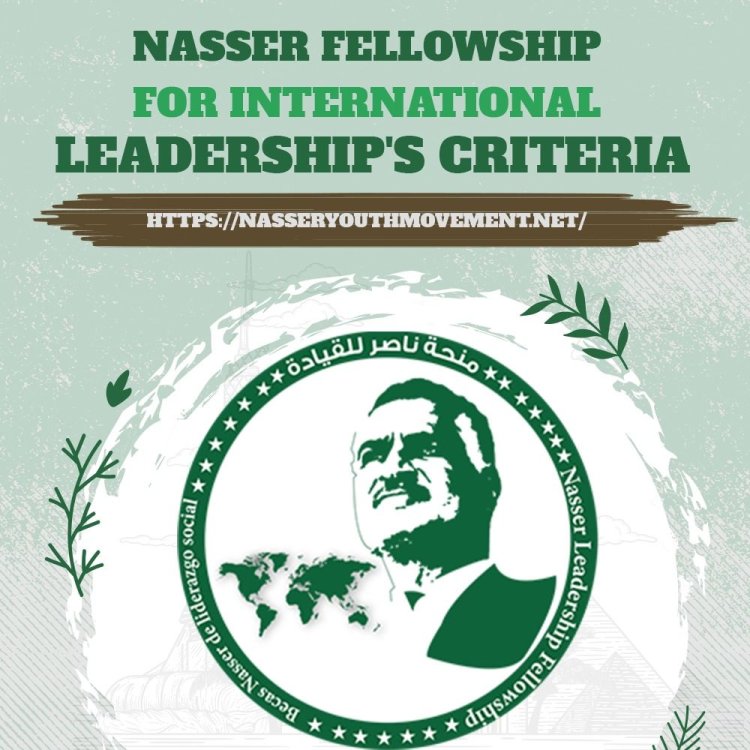Nasser Fellowship For International Leadership Selection Criteria

Selection Criteria and Evaluation Mechanisms for the Nasser Fellowship for International Leadership
The Nasser Fellowship for International Leadership aims to select an elite group of young leaders from around the globe based on precise and equitable criteria that reflect adherence to the principles of transparency and equal opportunity. These criteria align with Egypt’s Vision 2030, the Sustainable Development Goals (SDGs), and the continental, regional, and global agendas to which the Arab Republic of Egypt is committed. The comprehensive participant selection system ensures social justice and promotes leadership innovation.
First: General Conditions
- Age Group: Applicants must be aged between 18 and 40 years.
- Nationality: The fellowship is open to youth from all countries worldwide.
- Language: Proficiency in English is required, as it is the official language of the fellowship.
- Not resident in Egypt
Second: Selection Criteria
- Leadership and Professional Qualifications
Eligible applicants include decision-makers from the public and private sectors, graduates of programs under the League of Arab States, the African Union, and the United Nations, alumni of the National Academy for Leadership, executive leaders in public and private sectors, representatives of national committees for the World Youth Festival, members of national branches of the Non-Aligned Movement Youth Network, civil society activists, heads of national youth councils, sports federations, sports champions, municipal council members, young political party leaders, university faculty members, researchers in strategic and intellectual research centers, members of professional syndicates, journalists, media professionals, content creators, social entrepreneurs, and more.
- Gender and Inclusivity
- Gender Equality: 50% of seats are allocated to women and 50% to men.
- Inclusion of Persons with Disabilities: 5% of seats are reserved for persons with disabilities.
Third: Evaluation Mechanisms
- Initial Evaluation
- Review of compliance with basic eligibility criteria.
- Assessment of the quality, clarity, realism, and accuracy of responses in essay questions and the attached video.
- Key Evaluation Criteria
- English Proficiency: Assessing the applicant’s level of fluency in English.
- Video Quality: Evaluating the applicant’s ability to clearly present ideas.
- International Experience: Participation in international conferences or programs.
- Geographical Diversity: Ensuring diverse representation of participants.
- Personal Evaluation of Applicants
- The Organic Intellectual: Applicants with a cultural or developmental project aiming to create positive societal impact, reflecting their commitment to serving and advancing their communities.
- The Self-Learner: Applicants focusing solely on academic achievements without significant societal impact may align less with the fellowship’s objectives.
- Engagement in Global South Issues and International Work
- Social Media Impact: Analyzing the applicant’s influence on social platforms and their recognizing technology’s vital role.
- Interaction with Official Platforms*: Tracking the applicant’s engagement with the fellowship’s official platforms and adherence to its guidelines as an indicator of cooperation and commitment.
- Email Communication: Clear and accurate responses to emails during selection stages as a measure of the applicant’s seriousness.
- Awareness of Global South Issues: Evaluating the applicant’s understanding and support for issues such as sustainable development, poverty alleviation, inclusive education, climate justice, and reducing social and economic inequalities.
- Local Impact: Assessing the applicant’s influence within their local community through initiatives and projects that align with regional agendas such as Agenda 2063 and the SDGs.
- Experience in International Platforms: Identifying applicants with prior experience in international programs, UN conferences, or global dialogues fostering South-South cooperation.
- Understanding of Global Dimensions: Assessing the applicant’s comprehension of international issues and their relevance to the fellowship’s goals.
- South-South Cooperation: Priority is given to applicants who actively promote partnerships and collaboration between Global South nations, in line with the UN-supported South-South Cooperation Strategy.
- Vision for Future Contributions: Evaluating the applicant’s clear vision for enhancing South-South cooperation and offering innovative solutions to shared challenges after completing the fellowship. This is reflected in the applicant’s future plans as presented in the application and accompanying video.
One for all, all for one

